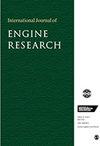确定双燃料 RCCI 发动机的循环空燃比并分析其低频和高频变化
IF 2.1
4区 工程技术
Q2 ENGINEERING, MECHANICAL
引用次数: 0
摘要
发动机中较高的循环变化(CV)会影响车辆的性能、排放和驾驶性能。较高的 CV 值是双燃料反应控制压燃(RCCI)发动机面临的挑战之一,主要是在较低负荷时。充气制备过程中的周期性差异(如空燃比 (AFR))会导致燃烧参数出现偏差。在汽油/甲醇-柴油 RCCI 发动机中采用了压力矩法(PMM)来估算 AFR 的循环差异。记录的循环缸内压力用于计算循环空燃比。确定周期空燃比后,应用统计分析和返回图分析空燃比、CA10、CA50、pmax 和 IMEP 的变化。为了检查周期[公式:见正文]的低频和高频差异及其与 CA10 的关系,进一步应用了小波变换(WT)。结果发现,估计的平均 AFR 与实验的平均 AFR 之间存在良好的关系。回波图显示,喷射开始时间越早(SOI),空燃比数据点越分散,相应地,CA10、CA50、pmax 和 IMEP 的数据点也越分散。WT 分析表明,双燃料 RCCI 燃烧中存在高频和低频变化。结果发现,在所有测试的喷射时间下,AFR 的高频差异在整个发动机循环中都是一致的。小波结果证实,AFR 的高频波动导致 CA10 和 IMEP 的差异。本文章由计算机程序翻译,如有差异,请以英文原文为准。
Determination of cyclic air-fuel ratio and analysis of low and high-frequency variations in dual-fuel RCCI engine
Higher cyclic variations (CVs) in the engine affect the performance, emissions and drivability of the vehicle. Higher CVs are one of the challenges in dual-fuel reactivity-controlled compression ignition (RCCI) engines, mainly at lower loads. Cyclic disparities in the charge preparation, such as air-fuel ratio (AFR), result in CVs in the combustion parameters. The pressure moment method (PMM) is employed in the gasoline/methanol-diesel RCCI engine to estimate cyclic disparities in AFR. The logged cyclic in-cylinder pressure is used to calculate the cyclic AFR. After determining the cyclic AFR, statistical analysis and return maps are applied for the analyses of variations in the AFR, CA10 , CA50 , pmax and IMEP. For examining the low and high-frequency disparities in cyclic [Formula: see text] and its relationship with CA10 , Wavelet transform (WT) is further applied. A good relationship is found between the estimated mean AFR and the experimental mean AFR. Return maps signify that for the earlier start of injection (SOI), the data points of AFR are more scattered correspondingly, the data points for CA10 , CA50 , pmax and IMEP are more scattered. WT analysis shows that both high-frequency and low-frequency variations are present in dual-fuel RCCI combustion. It is found that high-frequency discrepancies in the AFR are consistent throughout the engine cycles for all the tested injection timings. Wavelet results confirm that high-frequency fluctuations in AFR result in disparities in CA10 and IMEP.
求助全文
通过发布文献求助,成功后即可免费获取论文全文。
去求助
来源期刊

International Journal of Engine Research
工程技术-工程:机械
CiteScore
6.50
自引率
16.00%
发文量
130
审稿时长
>12 weeks
期刊介绍:
The International Journal of Engine Research publishes high quality papers on experimental and analytical studies of engine technology.
 求助内容:
求助内容: 应助结果提醒方式:
应助结果提醒方式:


